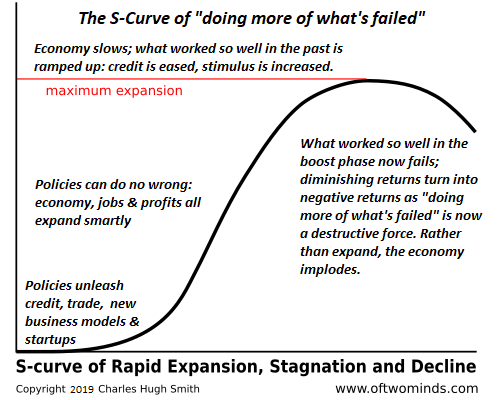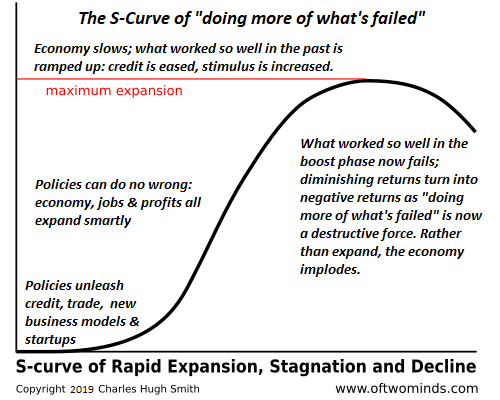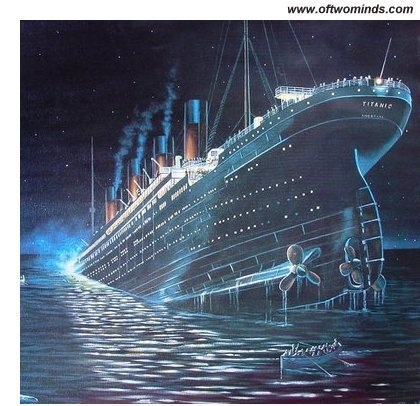
I like a rousing story as much as anybody else, however systems aren’t stories, and confusing the 2 won’t actually repair what’s not sustainable in the existing system’s configuration.
OK, I get it: all of us like Hollywood endings: the superhero saves the world, the wicked conspiracy is uncovered and the bad guys get their just desserts and the impossible romance gets rid of all the odds. This is why there are Hollywood endings: we are hard-wired to thrill to delighted endings and an effective conclusion to the Hero’s/ Heroine’s Journey.
We will endure an Awful Hero/ Heroine or the periodic Anti-Hero/ Heroine, but there is still a moral success of some sort to cheer.
The real life does not follow a storyline, it operates according to the determines of systems: inputs are taken up by processes which then produce outputs. If the outputs and processes do not change, the outputs do not change either.
One common manifestation of human hubris is the idea that getting someone to agree with us about something or other is some sort of victory, as if human viewpoints matter. They do not, unless they alter either inputs or procedures in very substantial ways. Fine-tuning inputs or policies may make us feel warm and fuzzy (“I’m part of the service!”) but they are too modest to alter the system’s inputs and processes. The net result is the outputs stay the same.
Put another method: identifying something or other a scam or an existential threat doesn’t alter anything in the systems that generate consequences. Whatever is going to occur as output is going to happen no matter what human beings identify it or their opinions about it (“El Nino actually draws!”).
Existing procedures constrain our choices. This is why it’s difficult to be an environmentally-sustainable saint. Let’s say we’re worried about climate change and the damage of the world’s biosphere. Let’s say we wish to lower our carbon footprint and “do the right things” to reduce the negative impact of our consumption and lifestyle.
This is where we replace Hollywood endings for reality. We like to believe that recycling matters. Sorry, it really doesn’t alter the inputs or processes enough to change the outputs in any substantial method. For instance, the percentage of lithium batteries and electronic waste that are currently recycled is near-zero due to the fact that the batteries and electronic devices aren’t manufactured to be recycled in an affordable way, and no one in the system pays for expensive recycling. So the truly essential recycling isn’t being done.
I still recycle cardboard since that looks like a much better option than discarding it in the land fill, however in terms of total lifecycle expenses and resource consumption of recycling versus landfill, I don’t have any data. The system isn’t set up to determine overall lifecycle costs and resource intake of items, services and processes, and since we only manage what we measure, we’re flying blind: the system is set up to determine “growth” (GDP) and revenues, not total lifecycle expenses and resource usage.
Sorry, there’s no Hollywood ending until we change the inputs (stop manufacturing lithium batteries) and/or the procedures (require 99% recycling of all electronic devices, batteries, cars, and so on). This will need changing the entire production and resource supply chain systems from the ground up, globally. If we do not do that, the output can’t possibly change in any consequential method.
The Hollywood ending is electric lorries will “conserve the planet.” Regrettable this is Hollywood, not truth. The majority of the intake of resources and damage to the planet happen in the mining, smelting and manufacture of the car, no matter its fuel. Due to their massive consumption of minerals, electric lorries take in far more of the world’s resources than an ICE (internal combustion engine) car.
All automobiles are manufactured (mining, smelting, transport, factories, etc) with hydrocarbons. There’s no difference between vehicles except electrical automobiles utilize much more hydrocarbons in their fabrication.
Then there’s the source of the fuel. An electric automobile produced by burning coal and charged with electrical power generated by burning coal remains in reality a coal-burning vehicle. Calling it “electric” fits the happy story, however it’s not actually factual: a coal-burning vehicle is an ecological catastrophe, no matter labels, our viewpoints or the happy-ending PR.
In the real world, the least harmful choice of lorry is a small, light, old ICE car that is well-maintained to conserve fuel and driven just seldom. Hey, take a look at me, I just drove my old 40-mile-per-gallon Civic 3,000 miles in 2015– I’m a saint!
Regrettably, the real world isn’t a Hollywood (or Bollywood) film, therefore I don’t get to be a saint once we take a look at the world as a system instead of a motion picture. The fertilizers I utilize to grow food in my lawn originated from afar, and even the natural ones consume huge amounts of hydrocarbons in their processing, bagging and shipping. The “natural” fruit or veggie shipped from afar is an environmental disaster compared to the organic fruit or vegetable from your own backyard, but even those need inputs that are part of the system.
I stepped on airliners a couple of times in the past year, one long-haul and 2 brief flights, and there is actually nothing ecologically saintly about consuming enormous resources by jetting around the globe.
Electric airplane will not “save the world,” either. They’re resource-hungry, little, sluggish, their variety is modest and their batteries are no more recyclable or long-lasting than all the vehicle batteries destined for the landfill. And alternative fuels for jet airplane are incapable of being produced at the scale required to change jet fuel. Sorry, no Hollywood ending.
To truly lower one’s consumption of the world’s resources, we would need to grow our own food, get around on our own feet or zero-fuel transport (motorless bike or skateboard or boat) and not purchase/ own/ utilize large resource-consuming devices such as automobiles, airplane, and so on.
The system as presently set up makes it almost difficult to do this. Even growing much of your own food requires delivery of fertilizers (natural or chemical, they still weight a lot). Extremely few locations are bike-skateboard friendly. The world is set up for large, mass-produced fueled vehicles. Beyond a few cities, public transport is incapable of getting people where they need to go in any sort of time-efficient way.
Consider the foundation of our way of life, the financial system. The story is “debt does not matter,” since we can outgrow increasing financial obligation forever. Our bag of monetary engineering techniques is bottomless, and there will constantly be another monetary rabbit we can pull out of the hat.
This is of course a fantasy. Debt ultimately consumes the system alive. So do repaired expenses, privileges, demographics and decreasing productivity. The inputs and procedures can’t be altered in any material way since they have to remain in their current scale and setup or the monetary system collapses under its own weight.
This brings us to the incentives to keep the inputs and procedures exactly as they are, with minor tweaks for PR functions. The system is set up such that elites and self-serving interests have the majority of the wealth and political power, and if even the tiniest bit of their skim is reduced, they will quickly devote the whole of their resources to reversing this outrage, for they all know how power works: if others manage to cut 1% from your skim, they’ll notice weak point and return for 10%.
The only reward that counts in our stripmined world is maximizing earnings and the private gains of the entrenched and effective. To cloak this reality, the Powers That Be promote public-relations propaganda that portrays their pillage, robbery, scams and destruction as a Hollywood story we can all take in and like, simply as we love our servitude once it’s been properly packaged into a Hero/ Heroine’s Journey or a Love Story.
This is why no one will do anything until it’s too late. It’s just when we lack essential inputs and/or important processes decay and collapse that we’ll awaken to the fact that since the worldwide system’s inputs and procedures materially changed, the outputs we require and enjoy all disappeared.
By the time inputs and procedures have materially changed, it’s far too late to reverse the procedure and go back in time. Once resource extraction processes break down, inputs are no longer readily available in the required quantities to feed all the procedures of globalized, industrialized production and transport. Since all these procedures are securely bound systems, that is, interconnected, the breakdown of any one supply chain or procedure rapidly falls dominoes throughout the system.
In addition to confusing delighted stories with systems, human hubris manifests in another way: we like to believe that minor tweaks occasionally that do not hassle us will magically alter the unfavorable outputs (resource exhaustion, environmental ruin, and so on). This is why we enjoy the Hollywood stories about electrical airplane (our really own electrical helicopter– yowza!), electric lorries, recycling the carboard boxes from FedEx, UPS and Amazon, and so on: we get all the conveniences and benefits we’re accustomed to, and we get to be environmentally-sustainable saints, too: it’s all sustainable and environmental and warm and fuzzy.
Other than it isn’t. That’s a fairy tale, not a system.
If you question the Hollywood ending, you’re dismissed as a doom and gloomer, a discontent who whines about pleased endings and techno-marvels.
I see this as confusing a story with a system. The story operates by its own guidelines: here are the barriers and powerful villains, here are the Hero and Heroine, outmatched and under pressure, but then, against all chances, the villains lose their grip, justice is served and enjoy triumphs.
Systems work by their own implacable guidelines. There are inputs and processes that produce outputs. The only method to change the outputs in a substantial style is to change the inputs and/or processes in a consequential style. Little face-saving PR tweaks are too little in scale to materially change either inputs or procedures, therefore the outputs won’t change and indeed, can’t possibly alter, because that’s how systems work.
So by all means, overlook all cautions and run the ship at full speed through an ice field. All too predictably, the ship collides with an iceberg and only then does anyone respond: OK, where’s the Hollywood story of brave engineers saving the ship and noble guests assisting each other onto lifeboats? What do you suggest, the ship will sink regardless of what’s done?
Does not our happy-ending story map reality? Unfortunately, no. The existing system is sinking and nobody will do anything besides more of what’s failed till it’s far too late.
I like a rousing story as much as anybody else, but systems aren’t stories, and puzzling the 2 won’t in fact repair what’s not sustainable in the present system’s configuration.
This confusion of story with system will create repercussions and opportunities which I go over in my books International Crisis, National Renewal and Self-Reliance in the 21st Century.


 My brand-new book is now available at a 10 % discount rate($8.95 ebook,$ 18 print): Self-Reliance in the 21st Century. Check out the first chapterfor free(PDF) Read excerpts of all 3 chapters Podcast with Richard Bonugli: Self Dependence in the 21st Century (43 minutes)My
My brand-new book is now available at a 10 % discount rate($8.95 ebook,$ 18 print): Self-Reliance in the 21st Century. Check out the first chapterfor free(PDF) Read excerpts of all 3 chapters Podcast with Richard Bonugli: Self Dependence in the 21st Century (43 minutes)My
current books: The Asian Heroine Who Seduced Me(Unique)
print$10.95, Kindle$ 6.95 Check out an excerpt totally free (PDF)
When You Can’t Go On: Burnout
, Reckoning and Renewal$ 18 print,$ 8.95 Kindle ebook; audiobook Check out the first area free of charge(PDF)Global Crisis, National Renewal: A(Revolutionary )Grand Technique for the United States(Kindle$9.95, print$24, audiobook)Read Chapter One free of charge (PDF ). A Hacker’s Teleology: Sharing the Wealth of Our Diminishing Planet(Kindle$ 8.95, print$20, audiobook$17.46)Check out the first area totally free(PDF). Will You Be Richer or Poorer?: Revenue, Power, and AI in a Traumatized World
(Kindle $5, print$10, audiobook) Read the very first area for free(PDF). The Experiences of the Consulting Thinker: The Disappearance of Drake
(Unique)$4.95 Kindle,$ 10.95 print); checked out the first chapters free of charge (PDF)Money and Work Unchained $6.95 Kindle,$15 print)Check out the first section totally free Become a$1/month patron of my work by means of patreon.com. Sign up for my Substack
totally free KEEP IN MIND: Contributions/subscriptions are acknowledged in the order received.
Your name and e-mail stay private and will not be given to any other individual, company or company. Thank you, Paul C.($300), for your beyond-outrageously generous contribution to this site– I am considerably honored by your steadfast support and readership. Thank you, Julius L.($ 50), for your superbly generous contribution to this website– I am greatly honored by your assistance and readership. Thank you, Michael T. ($35)
, for your fantastically generous contribution to this website– I am considerably honored by your steadfast assistance and readership. Thank you, Sarah S.($1/month), for your most generous pledge to this site– I am significantly honored by your assistance and readership.

